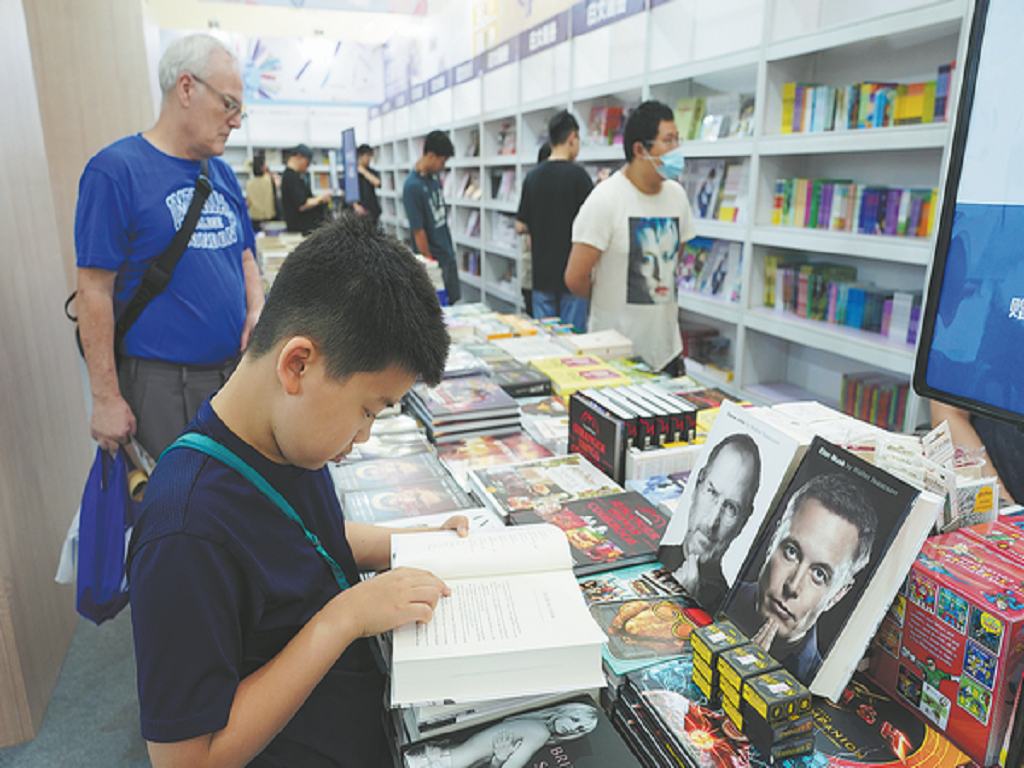Books, bags and lots more fun

One of China's biggest annual publishing events draws crowds from all over the country in search of something new, Zhang Kun reports.
The 20th Shanghai Book Fair, one of China's largest annual fairs for readers and the publishing industry, recently took place at the Shanghai Exhibition Center, attracting visitors from all over the country. It wrapped up on Tuesday after a 7-day run, during which it received more than 40,000 visitors a day over a busy weekend period.
At the main exhibition venue, people browsed through the 160,000-odd books being sold by 360 publishing houses, and attended book events for their favorite authors from China and abroad.
An Wenwen from Chongqing took an early flight on Saturday morning as she wanted to have a face-to-face meeting with her favorite authors. "Hearing their thoughts about books and writing may inspire me more when I read their books," said the young woman, who returned to Chongqing later the same night.
"Many guest authors later recalled their pleasant surprise when they attended the Shanghai Book Fair. The love of reading became a rare phenomenon in many parts of the world as we entered the 21st century. The Shanghai Book Fair is among the events that changed this," Yuan Xiaoyi, a translator and professor at the East China Normal University, writes in an essay for China Reading Weekly, reminiscing about her experience of attending the fair as both a reader and an author.
"By creating a cultural event and a cultural brand, Shanghai boosted the impact of bookstores, which had been on the decline. The fair made books and authors accessible to the public," Yuan adds.
"Thanks to my long-term work in the field of world literature, I am fortunate to be a regular visitor to the Shanghai International Literary Week, where I can feel, hear about and discover new books, new people, and new literature with other readers," she writes.
Started in 2011 as an important part of the annual fair, literary week has now evolved into a vital platform for cultural exchange and literary discussion among Chinese and international writers. Over the years, the event has hosted nearly 300 writers and scholars from around the world, including four Nobel Prize laureates in literature.
From laureates like France's Jean-Marie Gustave Le Clezio and Britain's V.S. Naipaul, to less well-known authors still struggling in their career, Yuan says that it was the authors' books, not their stardom or prestige, that won the heart of readers in Shanghai.
This year the main forum took place on Aug 13 at the China Securities Museum in Hongkou district with speeches by an array of international literary figures, featuring luminaries such as Angola's Jose Eduardo Agualusa, France's Christian Garcin, Russia's Eugene Vodolazkin, Japanese authors Kanae Minato and Mizuki Tsujimura, Spain's Andres Barba, Romanianborn Hungarian writer Attila Bartis, poet Forrest Gander and cartoonist Dan Nott from the United States, and a lineup of esteemed Chinese writers.
The fair's organizers also tried to find more creative ways to reach more readers, as proved by the long lines of people wanting to collect souvenir seals in front of different pavilions.
"I come every year," a retired woman surnamed Wang tells China Daily, as she waited in line to have a seal stamped in her note pad at the pavilion of People's Literature Publishing House.
"It's only in the past couple of years that these seals have become popular at the Shanghai Book Fair. They aren't only for children and young readers, I like them quite a lot too, because they look nice and evoke nice memories," she says, flipping through the pages to show the seals she collected in previous years.
The seals, which come with the logos, patterns and signature imagery of different institutions and subjects, have been designed by publishers, who invite visitors to have them stamped on the title page of the books they purchase. This year, collecting the seals as souvenirs has also proved popular for many visitors to the fair.
"This is just a new means to reach out to readers. We have an online bookstore, and in the past, we've held frequent book launches and reading events online and offline, and more recently, we introduced a WeChat mini-program," says Han Weidong, director of the Shanghai Translation Publishing House. "We are also working with social media influencers to have them spread the message about new books.
"We often hear people say that we have published so many great books, but the market has evolved and people have such varied, and short spans of interest nowadays, so we have to continuously find new ways to engage them," Han says. "It is not enough to just say how great the books are, we have to look for things that grab attention, introduce new subjects and great authors, and convince people that reading will help solve problems in real life."
To achieve this, publishers also sell colorful book-themed merchandise at the fair, which has proved popular with buyers, some selling even more than the books they are about.
The Guangxi Normal University Press introduced the Kafka Tote at the fair last year. The canvas bag is embroidered with the signature of author Franz Kafka, alongside a quote of his in German that reads: "Despite the crowds, everyone is silent and isolated within themselves."
"Since last year, we have sold more than 20,000 of those totes," says Wu Haijiao, who works at the press.
Some visitors came looking for the bags, including one woman surnamed Li who works nearby and visited the fair during her lunch break. "I came first to check out the Kafka Tote," she says. "Good merchandise like this not only satisfies contemporary aesthetics and functional needs, it also spreads the ideas and attitudes of the author and publisher."
The weeklong fair gained a total sales of 48 million yuan ($6.7 million), along with another 5 million from products like the tote bag, according to updates on Wednesday.